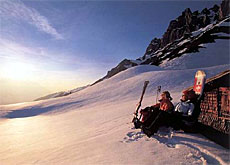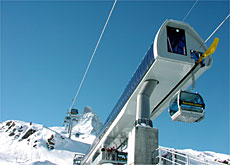Investment race in Swiss Alps causes alarm

Millions in public funds are being squandered on unnecessary expansion projects in Switzerland’s ski resorts, according to environmental groups.
The groups said overdevelopment was also damaging the natural ecological balance of high-altitude regions.
According to a new study, there are currently 113 projects under consideration to develop and expand Switzerland’s ski areas, requiring investments of SFr3.5 billion ($2.7 billion).
Swiss environmental groups on Friday likened the expansion drive to that of the 1970s, when a flurry of ambitious projects were allowed to swallow up vast areas of land, often without a sound business plan.
“The [number of new projects] is completely unrealistic because most of them are not viable in this economic climate,” Felix Maurhofer of the Swiss Cable Car Association, told swissinfo.
Pro Natura, WWF Switzerland and the Swiss Foundation for Landscape Conservation said many of these projects – particularly the creation of new ski pistes and skiing infrastructure – made no economic sense.
“There’s already an oversupply of cable cars and chair lifts,” Maurhofer said.
Two-thirds of Switzerland’s cable car operators are in dire financial straits because of dwindling visitor numbers. Numerous resorts, such as Bourg-St-Pierre and Saas Almagell in canton Valais, are also losing money.
“Many Swiss ski resorts have financial problems… so it’s completely unnecessary to build new ones,” Christine Neff of the Swiss Foundation for Landscape Conservation told swissinfo.
“And many of these resorts are being helped financially by the government, even though they harm the environment.”
Damage?
The environmental damage that was being inflicted on high-altitude regions could in itself harm the tourism industry in the long term, the environmental groups said.
“A lot of ski resorts require forests to be cleared, and they harm the ground so that many plant species are being destroyed,” said Neff.
Many animal species are also at risk, according to Pro Natura.
The groups called on authorities to stop funding projects in skiing areas below 1,500 metres, and said approval for new developments should only be granted when these were financially viable.
“We have the right legislation in place and it’s we up to the government and politicians to promote sustainable development,” Neff explained.
However, Swiss tourism official, Roger Seifritz, rejected the accusation that Swiss ski operators were on an ambitious expansion drive.
Speaking from his office in the mountain resort of Gstaad, Seifritz told swissinfo that damage to the environment was minimal.
“In Switzerland, refurbishments are a large part of investment in ski resorts, such as [putting in] a new ski-lift,” he said.
Seifritz added that virgin nature was not affected at all by money being pumped into the ski industry, unlike in Switzerland’s neighbours Austria and Italy, where untouched areas were being developed.
swissinfo with agencies
Environmental groups say the majority of projects to expand and develop ski resorts are financially unsound.
They also threaten to wipe out rare plants and animals.
Around two-thirds of Swiss ski resorts and cable car companies are struggling financially.

In compliance with the JTI standards
More: SWI swissinfo.ch certified by the Journalism Trust Initiative


You can find an overview of ongoing debates with our journalists here. Please join us!
If you want to start a conversation about a topic raised in this article or want to report factual errors, email us at english@swissinfo.ch.